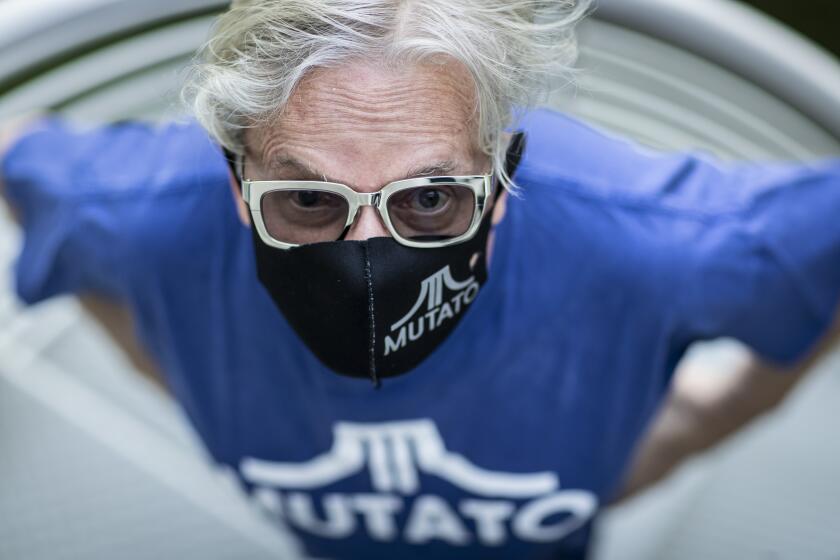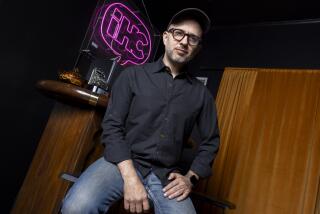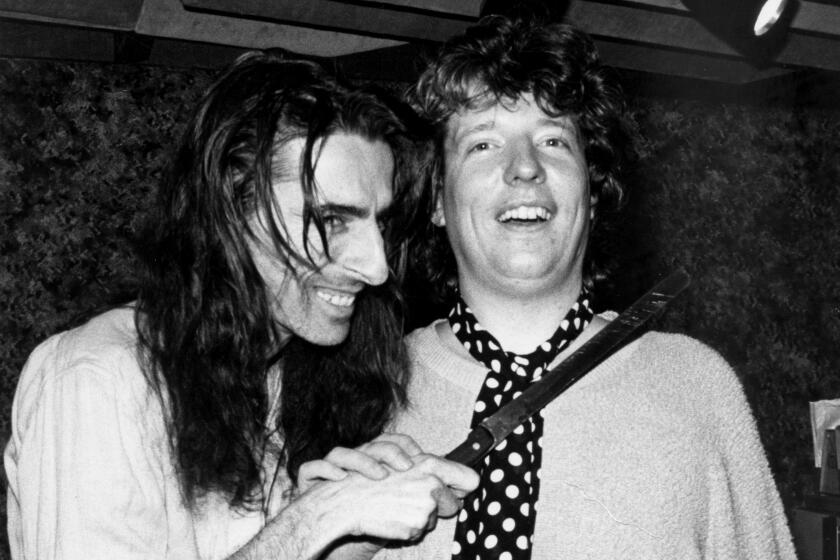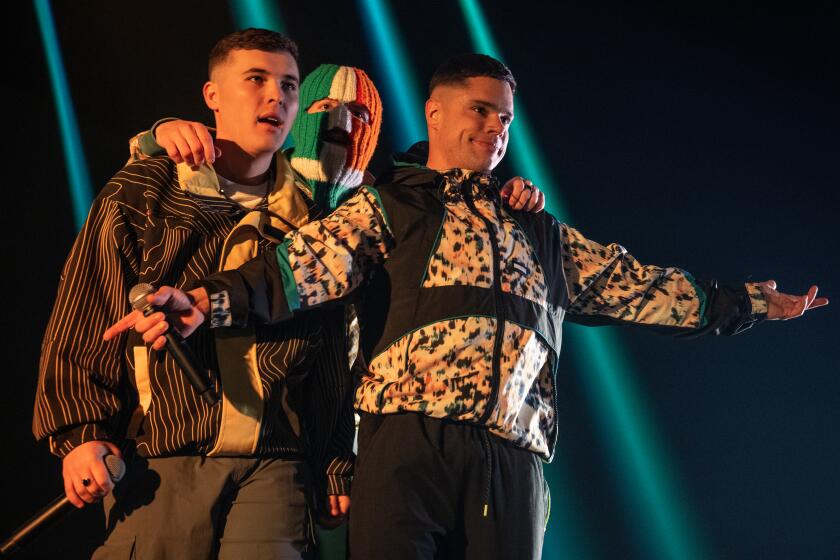As COVID-19 grinds on, the fate of L.A.’s music clubs rests with a divided Congress
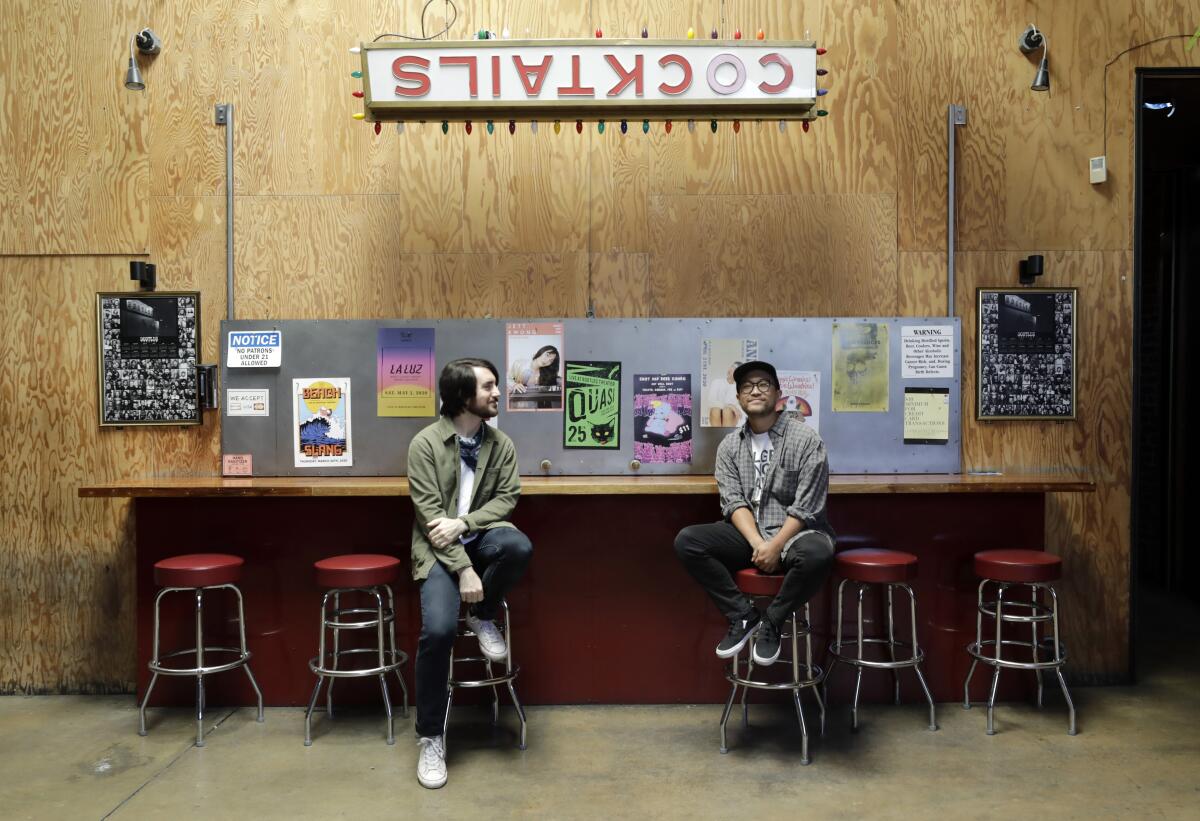
- Share via
In February, Kyle Wilkerson planned on booking 400 shows at the Bootleg Theater this year.
The first months of 2020 looked great for the Westlake venue. It might have been the best year since the 36-year-old Wilkerson and his promotion firm Sid the Cat took over bookings in 2015. The 250-capacity club (and its attached 500-seat space for live theater) had packed-out residencies from Mandy Moore and Moses Sumney. The jobs of the Bootleg’s 30 or so staffers were on strong footing.
“We got the club to the point where we were really rolling and helping people with their careers, which is always the most fulfilling part,” Wilkerson said.
But after COVID-19 upended everything, the venue went dark in March, along with nearly every other room for live music in the U.S. Now it’s September and there are no signs of the pandemic subsiding soon.
Devo cofounder Mark Mothersbaugh spent weeks in Cedars-Sinai hospital, hooked up to a ventilator, his mind wracked by violent hallucinations.
Absent federal intervention, an estimated 90% of independent concert halls and clubs like the Bootleg will likely shutter within months, according to member surveys from the National Independent Venue Assn.
Wilkerson never imagined that instead of booking concerts this summer, he’d be frantically emailing everyone he knew pushing for legislation that might be the only way to save his industry from collapse.
But finally, lawmakers are listening.
“They have been some of most hard-hit businesses and employees in the country,” said Sen. Amy Klobuchar (D-Minn.), who in late July introduced the Save Our Stages bill, which would give billions in grants to small music and arts venues nationwide. “One thing we’ve learned since this started is that not all industries are alike, and you simply can’t go to a mosh pit in the middle of a pandemic.”
If the bill passes, likely as part of a larger pandemic relief package, the Bootleg and clubs like it might hang on long enough to turn on the lights again next year.
“Save Our Stages will extend our time to keep this pause going, and we can rest easier knowing that we can still be a club,” Wilkerson said.
Morgan Wallen’s new song, “7 Summers,” may sound like ’70s soft rock, but it‘s breaking streaming records and rubbing chart elbows with Drake and Harry Styles.
The stakes couldn’t be higher for thousands of small- and medium-size live music and art spaces across the country that were already facing rising rents and the creeping monopolization of touring by global firms like Live Nation and AEG. It’s a rough-and-tumble business in the best of times, but the mandatory closures needed to combat COVID-19 have left them on a cliff’s edge — one unique to an industry that depends on people gathering in tight spaces.
Some hospitality and entertainment industries like restaurants and film production have resumed, if fitfully. Drive-in concerts are sometimes a surreal substitute for outdoor shows. But indoor live music is incompatible with most necessary public health measures or nonviable at the reduced capacity needed to stay safe. Venue operators were prepared for a few months of closure, but a whole year or more in the dark (and $9 billion of lost industry revenue in 2020, according to Billboard) is just not possible.
“It feels like being told that in order to survive, you have to run a marathon. But at the 25th mile, they say, ‘Oh, no, it’s an ultra marathon. You have another one to run, and this time wearing a backpack full of cement,’” said Audrey Fix Schaefer, a spokesperson for the association who works for several Washington, D.C.-area venues like the Merriweather Post Pavilion, the 9:30 Club and the Anthem. “With zero revenue and enormous overhead, it’s impossible for even the best business person to survive this without federal assistance.”
On Tuesday, association-allied venues will light their exteriors red to show the spaces that are in critical danger. Across L.A., the Satellite is already done for as a music venue, and even the Troubadour is in rough seas. If places like the Bootleg, which hosted shows from Arcade Fire, Childish Gambino and Fiona Apple, and incubated the careers of L.A. acts like Phoebe Bridgers, go under, they’re probably not coming back as risk-taking arts spaces.
“If historically important places like Bootleg and Troubadour didn’t exist, it would take years for new spots to pop up, and the things that replace it will be empty high-rise condos that no musician could afford to live in,” said Christian Lee Hutson, an L.A. singer-songwriter and frequent collaborator of Bridgers and Conor Oberst. He recorded a cover of ABBA’s “Dancing Queen” for an impromptu fundraiser for the Bootleg that raised $30,000 for its staff.
But, says Hutson, “venues are not going to survive on the goodwill of people donating.”
Klobuchar’s Save Our Stages bill would take some of that pressure off. After seeing the predicament of Minneapolis’ First Avenue — Prince’s home club, and where the Replacements, Hüsker Dü and scores of other acts got their starts — she co-sponsored Save Our Stages with Republican Sen. John Cornyn, whose home state of Texas saw cancellation of the South by Southwest festival in Austin as a harbinger of the COVID-19 doom to come.
The bill would allocate $10 billion for grants to live venues, talent agencies and promoters with fewer than 500 full-time employees and that are not publicly traded companies or operate in more than one country or 10 states. Grants would equal 45% of their 2019 revenue (up to $12 million), with additional funding available if the venue has still lost 80% of its income by December. Unlike the funds under the Paycheck Protection Program, which many clubs found impossible to procure, this money could also be used for expenses like rent or mortgages, utilities and insurance.
Other proposed bills, like the RESTART and ENCORES acts, would have broad benefits for businesses that have been decimated by COVID-19. But Save Our Stages directly acknowledges both the singular hit that independent live music has taken during the pandemic and the irreplaceable role these venues play in big and small communities alike.
It already has a broad coalition of support in the House and Senate, and musicians from Billie Eilish to Robert Plant and Lady Gaga have signed a letter of support. Senate Minority Leader Chuck Schumer (D-N.Y.) has signed on as a co-sponsor, and Senate Majority Leader Mitch McConnell (R-Ky.) has taken calls from home-state musicians Sturgill Simpson and Jim James pushing to save venues.
“That’s one of the reasons we’ve been able to pick up a lot of [bipartisan] support, because a lot of red states have towns where a music venue or theater is really important,” Klobuchar said. “The Fargo Theatre is really important [to North Dakota], and country music venues across the South and West are really important there as well.”
Several booking and talent reps working with the National Independent Talent Organization said that without a coherent national plan for saving local venues, the live industry might take years to recover, even after venues can legally reopen.
“It takes time to ramp up, even if venues open in May or June next year,” said Stormy Shepherd of Leave Home Booking in Salt Lake City. “Managers and agencies may not see any income until mid-summer, and that’s optimistic.”
“There’s a whole ecosystem of jobs and titles and people who are affected by this,” said Tom Chauncey of Partisan Arts, a booking firm in Sausalito. “Touring doesn’t work until venues are at capacity, which is going to take months. If venues start to leave, it will be a disaster.”
“This is a genuine threat to the existence of independent music,” added Frank Riley of booking agency High Road Touring, also in Sausalito. “Not just venues, but everyone. You take that out, and you lose a whole generation of music.”
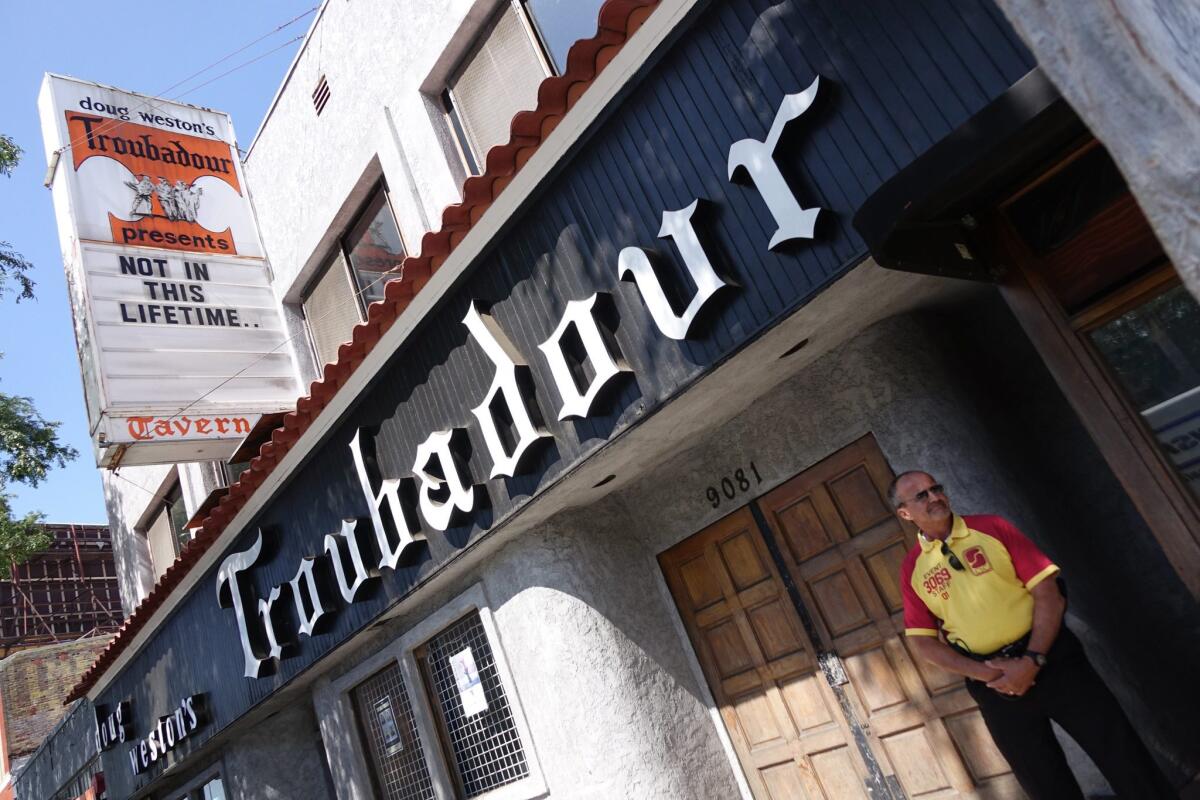
On Aug. 12, about a dozen members of the talent organization and other affected industries gathered in front of empty banquet tables and a car caravan outside L.A. Live to demand attention from state and national governments.
“I might survive this, but I can’t help but wonder how all the people from the bottom up are surviving. There’s a lot of angst being built up,” said Mike Ness, the singer and founder of O.C. punk stalwarts Social Distortion.
Klobuchar is optimistic that a relief package that includes Save Our Stages is possible, but it will have to get through a divided Congress where another stimulus package has stalled. “It’s part of a bigger negotiation, and at this point it’s in Republicans’ hands,” Klobuchar said. “It’s hard to do when people don’t have unemployment, when they don’t have postage for voting. Its success is tied to getting a larger bill done.”
But the window to salvage these venues is closing every month. “It’s almost as if we’re waiting for a liver transplant,” Schaefer said. “It’s got to come in while you’re still alive to be meaningful.”
Back at the Bootleg, Wilkerson and his team are holding on as best they can. They’re lucky in some respects, as the club did receive some PPP funding and nonprofit grants for its theater programming. But Wilkerson estimates that it will take “into six figures” for the club to survive the year and much more if COVID-19 shutdowns continue into next spring and summer.
These next few months will determine if there’s a future for the club or not.
“People remember these fond nights with their friends; people meet the love of their life here,” Wilkerson said. “It’s hard to compare these spaces to other things, but it is kind of holy, because so much happens there. When they’re gone, maybe something fills the void, but it will never be the same.”
More to Read
The biggest entertainment stories
Get our big stories about Hollywood, film, television, music, arts, culture and more right in your inbox as soon as they publish.
You may occasionally receive promotional content from the Los Angeles Times.
